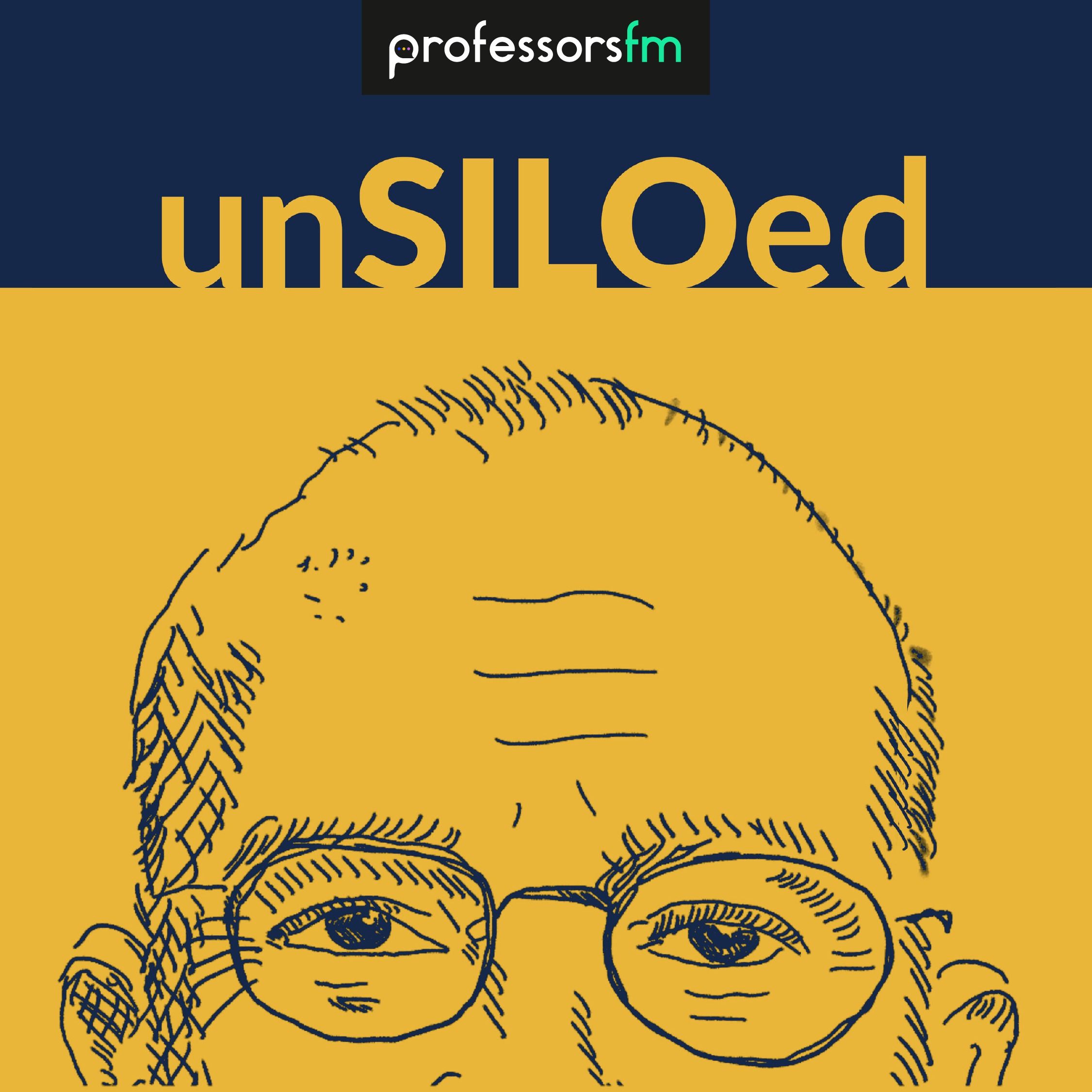

unSILOed with Greg LaBlanc
Greg La Blanc
unSILOed is a series of interdisciplinary conversations that inspire new ways of thinking about our world. Our goal is to build a community of lifelong learners addicted to curiosity and the pursuit of insight about themselves and the world around them.*unSILOed Podcast is produced by University FM.*
Episodes
Mentioned books

Apr 12, 2024 • 1h 3min
407. The Delicate Balance of Teaching and Research in Modern Academia feat. Nicholas Dirks
Nicholas Dirks, President and CEO of the New York Academy of Sciences, discusses challenges in maintaining academic freedom, faculty governance, and student activism in universities. They explore the balance between research and teaching, fostering interdisciplinary studies, and adapting to the demands of the 21st century while preserving academic freedom and intellectual debate.

Apr 10, 2024 • 56min
406. Tackling Healthcare’s Big Business with Elisabeth Rosenthal
Elisabeth Rosenthal, senior editor at KFF Health News, discusses the complex healthcare pricing system, revealing how multiple intermediaries inflate medical bills. They explore the profit-driven motives behind rising costs, emphasizing the need for transparency in billing. The podcast delves into the impact of private equity in healthcare and the challenges individuals face navigating pricing and insurance complexities.

Apr 8, 2024 • 55min
405. Reassessing the Moral Narrative of Colonialism and Morality feat. Nigel Biggar
The podcast features Nigel Biggar, a theologian and author, discussing the moral narrative of colonialism and historical accuracy. They debate the balance between facts and political objectives, critique activist historians, and explore the Ethics and Empire Project's examination of empires across cultures. The conversation delves into the complexities of colonialism, anti-colonial critiques, and the impact of European powers on indigenous populations.

Apr 3, 2024 • 1h 11min
404. The Evolution of Burnout with Christina Maslach
Christina Maslach, a psychology professor, discusses the evolution of burnout with Greg LaBlanc. They cover the history of burnout, the impact of work quality and environment on burnout, and the six core needs for employee well-being. The conversation delves into distinguishing burnout from exhaustion and the importance of addressing workplace stressors for individual and organizational well-being.

Apr 1, 2024 • 53min
403. Bridging Worlds: Explorations in Science, Spirituality, and Social Dynamics feat. David Myers
Professor David Myers explores the overlap of psychology with philosophy and the impact of genetics vs. environment on happiness. They discuss the 'religion factor' in personal happiness, the balance between intuition and analytical thinking, and the influence of teachers on student success. The podcast delves into the tech revolution's mental health impact, the intersection of psychology and religion, and the implications of heavy social media usage on children's well-being.

Mar 29, 2024 • 1h 7min
402. Replacing Democracy with Epistocracy feat. Jason Brennan
Georgetown University Professor Jason Brennan discusses the flaws of democracy and proposes epistocracy as a better alternative. They explore voter ignorance, social affiliations, and the influence of expertise in decision-making. The conversation delves into the challenges of rational voting behavior, the limits of crowd wisdom, and alternatives to representative democracy. Jason also shares insights on pursuing a PhD and navigating career paths in academia.

Mar 27, 2024 • 52min
401. Why Science is Fundamentally Irrational feat. Michael Strevens
Michael Strevens, a philosophy professor, delves into the irrational elements in modern science. He discusses the motivations and aesthetics driving scientific progress, touching on the balance between empirical data and intellectual context. The podcast explores the human aspects of scientific inquiry, revealing the joy of understanding causal models. Strevens reflects on the rule of science and the significance of adhering to agreed-upon rules in scientific research.

Mar 25, 2024 • 1h 10min
400. The Essence of Human Bonds from Tribes to Modernity feat. Robin Dunbar
Explore the essence of human connections with Robin Dunbar, discussing the impact of friendship, religion, and storytelling on our well-being. Discover the evolutionary forces behind social bonds and the practical applications for modern-day relationships and organizational cultures. Dive into the dynamics of friendship, group sizes, and the collegiate system's intense bonding experiences at universities like Oxford and Cambridge.

Mar 20, 2024 • 60min
399. The Science Behind Human Connection and Engagement feat. Nicholas Epley
Discover the transformative power of simple interactions like asking about someone's day. Nicholas Epley and Greg delve into social nuances, cross-cultural engagement, and the impact of technology on interactions. Uncover the science of social cognition and how it can enrich personal and professional relationships.

Mar 19, 2024 • 1h 13min
398. Navigating the Ideological Shift in Academia feat. John Ellis
Exploring the dominance of left-leaning ideologies in academia, John Ellis and Greg discuss the consequences of political correctness and identity politics. They highlight the impact on traditional scholarly perspectives and society's dialogue. The conversation raises questions about the sustainability of ideological shifts and the need for diverse viewpoints in academic departments.


